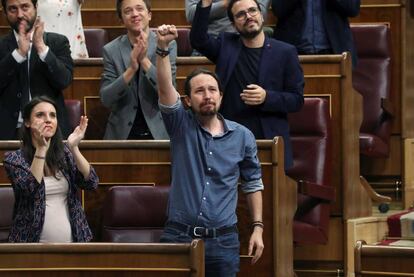No-confidence motion against Spanish prime minister gathers momentum
Mariano Rajoy calls the Socialists “Torquemadas” because of their “inquisitorial approach”

With just two days to go before Spanish Prime Minister Mariano Rajoy faces a confidence vote in Congress, not even the party that filed the motion is certain of its success.
“Everything is still open,” said one high-placed source in the Spanish Socialist Party (PSOE), whose leader Pedro Sánchez is hoping to replace Rajoy following a two-day debate scheduled for Thursday and Friday.
This is a yes/no answer, there is no room for middle-of-the-road positions
PSOE chief Pedro Sánchez
Spain’s 350 deputies will face the question: “After learning about the Gürtel ruling, can Mariano Rajoy remain the head of government?” Sánchez said that “this is a yes/no answer, there is no room for middle-of-the-road positions.”
Sánchez, who needs 176 votes but only has 84 seats in a fragmented lower house, has been contacting other parties since Monday in an attempt to forge agreements that will enable him to unseat the Popular Party (PP) leader. He is pledging to call a snap election on any future date that all opposition parties can agree on.
“Torquemadas”
Sánchez filed the motion last Friday, a day after a court found former PP officials guilty of embezzlement, tax evasion and other crimes in a sweeping kickbacks-for-contracts case known as Gürtel. The PP itself has been slapped with a heavy fine after judges found that it had benefited financially from the corruption scheme, although the party itself never faced criminal charges.

PSOE sources said that filing the motion was an ethical imperative regardless of whether it prospers or not. The PP has been struggling with a series of corruption scandals that have eroded its public image, and polls shows that a significant chunk of voters have switched to the reform party Ciudadanos, which has adopted a tough stand on corruption and Catalan independence.
But at a session of Congress on Wednesday, Rajoy compared the Socialists to Torquemada, a leading figure of the Spanish Inquisition, because of their “inquisitorial approach.” He insisted that the PP never faced criminal charges in the Gürtel case, and that no serving PP official has been convicted in the trial.
Alternative motions
Ciudadanos and the other protest party to emerge out of Spain’s economic crisis, the leftist Podemos, are already working on alternative no-confidence motions of their own in case this one fails. Ciudadanos needs support from another party to lead a new motion, while Podemos could table one on its own.
Such an “instrumental” motion would appoint an independent PM whose only task would be to call a snap election before the end of the year. On Wednesday, Ciudadanos suggested three possible names, all of them veteran Socialists: Ramón Jáuregui, Nicolás Redondo Terreros and Javier Solana, who is also a former NATO chief.
Ciudadanos has suggested former NATO chief Javier Solana as a potential interim PM
“If Pedro Sánchez is defeated on Friday, there is a preferable option to a PP government: working to ensure new elections as soon as possible,” said Podemos leader Pablo Iglesias.
Podemos would rather see Sánchez become the interim PM and form a “progressive government,” while Ciudadanos, which is heading voter intention surveys, would rather have Rajoy himself call an early poll. But Rajoy has said that he plans to serve out his full term, which expires in 2020.
Rajoy, 63, already survived a no-confidence vote by Podemos in June of last year.
Difficult math
While Sánchez can count on 67 votes from the leftist coalition Unidos Podemos, he will still need support from deputies representing smaller regional parties from the Basque Country and Catalonia – including the Catalan Republican Left (ERC) and PDeCAT, which have been leading the unilateral independence drive. On Wednesday, the ERC confirmed that its nine lawmakers will support Sánchez in order to eject “corrupt individuals and thieves,” in the words of ERC deputy Gabriel Rufíán.
Faced with criticism from Rajoy that he wants power “at any price,” the Socialist leader has stated that he will not negotiate any concessions to separatist parties in exchange for their support. “If he wanted to be the prime minister at any price, he would try to, but he’s not doing so,” said a regional premier.
Joan Baldoví, spokesman for the Valencia regional party Compromís, said that the PSOE has expressed a willingness to negotiate after Sánchez takes office, if the no-confidence vote prospers.
No information has emerged about the PSOE’s conversations with PdeCAT, the party of ousted Catalan leader Carles Puigdemont and of his successor Quim Torra, who had asked Sánchez to support the release of politicians in pre-trial custody in exchange for his vote. On Tuesday, Torra announced that he is changing his cabinet lineup, removing the names of jailed and self-exiled candidates in order to unblock the protracted political deadlock and ensure that Madrid lifts direct rule over the region.
English version by Susana Urra.
Tu suscripción se está usando en otro dispositivo
¿Quieres añadir otro usuario a tu suscripción?
Si continúas leyendo en este dispositivo, no se podrá leer en el otro.
FlechaTu suscripción se está usando en otro dispositivo y solo puedes acceder a EL PAÍS desde un dispositivo a la vez.
Si quieres compartir tu cuenta, cambia tu suscripción a la modalidad Premium, así podrás añadir otro usuario. Cada uno accederá con su propia cuenta de email, lo que os permitirá personalizar vuestra experiencia en EL PAÍS.
¿Tienes una suscripción de empresa? Accede aquí para contratar más cuentas.
En el caso de no saber quién está usando tu cuenta, te recomendamos cambiar tu contraseña aquí.
Si decides continuar compartiendo tu cuenta, este mensaje se mostrará en tu dispositivo y en el de la otra persona que está usando tu cuenta de forma indefinida, afectando a tu experiencia de lectura. Puedes consultar aquí los términos y condiciones de la suscripción digital.








































